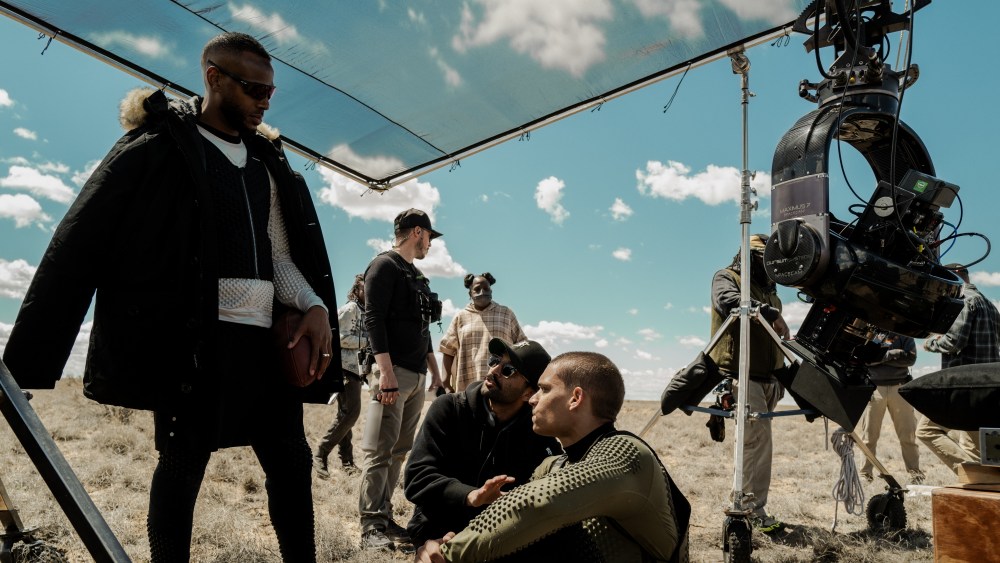What Is it About? Director Justin Tipping Explains
Justin Tipping‘s “Him” is the story of hotshot quarterback draft pick Cameron Cade (Tyriq Withers) learning the ropes of professional ball — and the opulent lifestyle success brings — through the mentorship of the legendary QB Isaiah White (Marlon Wayans). Along the way, Cam learns about the dark secrets that allow for fame and the sacrifices he must make to get what he wants.
The film remixes horror tropes to touch on many big ideas: Masculinity, stalking, parasocial relationships with celebrities, race, athletes’ self-worth and much more. Yet Tipping, who first came onto the project when Skip Bronkie and Zack Akers’ script was called “GOAT” before giving it his own polish, says he was inspired to create a project that, at its core, examines America’s obsession with “exhaustion economy.”
“It’s the fundamental feeling of, ‘What are you willing to do, what are you willing to sacrifice to be great at what you do?’ It transcended this very niche thing of a quarterback in professional sports. It actually applied to me at the time,” Tipping says. “I was burnt out from shooting TV post-pandemic, and making money was the most depressed I’ve ever been. I realized this is universal, whether you’re a writer or a journalist, a painter, or a day laborer. Society at large post-pandemic really had to reckon with: How do we spend our time? Is it really worth it to do this? I was questioning: ‘How many birthdays did I miss? How many weddings did I miss? Why didn’t I fly back for the birth of my nephew?’ I thought that in American culture, I was supposed to grind and hustle. So writing this was an emotional journey for me.”
Tipping first made his mark with 2016’s critically acclaimed indie “Kicks,” and then landed high-profile TV directing gigs, helming episodes of shows like “The Chi,” “Black Monday” and “Dear White People.” His drive echoed the preternatural focus and work ethic of the athletes in “Him.”
“After ‘Kicks,’ my first day on the first paid gig I ever had was on a TV show,” Tipping says. “I got a call halfway through the day that my father died, just unexpectedly, randomly. Two weeks later, I went back to set and didn’t stop shooting until I got burnt out and my body shut me down. There’s a monologue in ‘Him’ about how the field’s a safe place. I can talk to that now, but subconsciously, I was working through it.”
One of Tipping’s most critical partners in achieving this vision was filmmaker Jordan Peele, who was a producer on the project and helped foster some of the freakier horror elements of the film.
“He’s the perfect sounding board,” Tipping says. “Because he comes from a filmmaker point of view, he understands ‘I’m not directing the movie, you’re directing the movie.’ So you’re starting from a place of ‘What are you going for?’ and working backwards. Some of the best times would be when I’d say, ‘I have this fucked up, crazy idea, but I don’t know if this is going to fly.’ It was a safe space to say, ‘What about this,’ and then it felt like a really amazing tennis rally. A lot of the weirdness comes from our conversations.”
Yet even with the scares, Tipping is excited to get people thinking critically and talking about one of America’s biggest pastimes.
“The themes I was most interested in are, ‘What happens when the athlete becomes the commodity in the institution?’” he says. “If your body’s your only capital, and you get injured or age out, you are just a warm body that is moved through spaces and is disposable. If that’s the horrific, underlying thing, I think there’s a lot to explore there. That’s what opened up all the things that came after, where you could wink to horror subgenres. But it’s tackling all at once the business side of sports, and the dark side of the business.”

